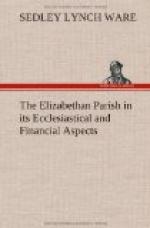[9] Cordy Jeaffreson, Middlesex County Records, i, 100-1 (Indictment reciting that John Johnson had had due notice in his parish church, yet had not sent his wain, etc., 1576). Cf. provisions of the statutes 5 Eliz. c. 13, and 18 Eliz. c. 10, Stats. of Realm, iv, Pt. i, 441-3, and 620-1 respectively.
[10] Brownlow v. Lambert, C.B., 41 Eliz., I Croke Eliz. Rep., Leache’s ed. (1790), Pt. ii, 716.
[11] Canterbury Visit., xxvi, 23 (1599); ibid., 20 (1591). W.H. Hale, A Series of Precedents in Criminal Causes from the Act Books of the Ecclesiastical Courts of London, 1475-1640 (pub. in 1847), 190 (Schoolmaster of Stock presented in court for defacing the church “in makinge a fire for his schollers,” 1587). This work hereinafter cited as Hale, Crim. Prec.
[12] Constables Acc’ts of Melton in Leicester Architec. and Archaeol. Soc. Trans., iii (1874), 72-3. Chelmsford Churchwardens Acc’ts in Essex Archaeol. Soc. Trans., ii (1863), 225 ff.
[13] Stratton (Cornwall) Churchwardens Acc’ts, Archaeologia, xlvi, 200 ff. s. a. 1565 and editor’s note.
[14] “Sir W.. A.. and I with divers other justices, being met together at Sondon church” (1582). Strype, Annals of the Reformation, iii, Pt. ii, 214. This meeting here may have been in the churchyard.
[15] See in the Antiquary, xxxii (1896), 147-8, the inquest held at St. Botolph Extra Aldgate (1590), and the coroner’s judgment delivered in the church that a suicide should be buried at cross-roads with a stake through her breast.
[16] For the noisy proceedings in Bow Church and in St. Paul’s, London, see The Spiritual Courts epitomised [etc.], a satire printed in 1641 at London. For this and similar satires see Mr. Stephen’s Catalogue of Political and Personal Satires in Brit. Mus. (1870). Cf. Strype, Life of Grindal (Oxon. ed. 1821), 83 ff. (Proclamation of 1561 for reverent use of churches). Also Augustus Jessop, One Generation of a Norfolk House, 15. Sir J.F. Stephen, Hist. of Criminal Law, ii. 404.
[17] In the Canons of 1571 the churchwardens are called “aeditui,” in those of 1604 “oeconomi.” In the older churchwardens accounts their Latin designations are “gardiani” and “custodes,” sometimes “prepositi” (or ’reeves’). English equivalents are churchmen, highwardens, stockwardens (alewardens even), kirkmasters, church masters, proctors, etc. Sidemen are called also questmen, assistants and (apparently) sworn men or jurates. They do not always appear in small country parishes, neither are they generally found before the latter half of Elizabeth’s reign. Their Latin appelation was “fide digni” and they were chosen from among the parishioners to the number of two, four, six or more to present offences along with the churchwardens, or offences which the wardens would not present (Gibson, Codex, ii, 1000). The sidemen went about the parish during service time with the wardens and warned persons to come to church (See p. 23 infra). For rector, etc., see p. 30 infra.




